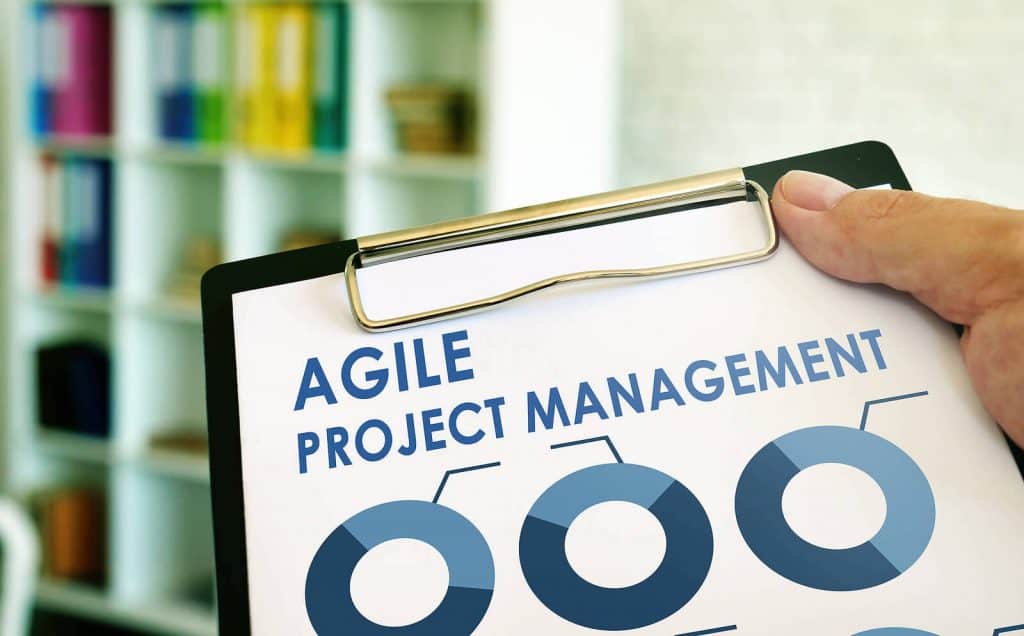Agile project management rethinks how projects are managed throughout their lifecycle in order to improve the chances of success and provide improved control over the outcomes. There is no single methodology to define what is agile project management; there are several, each of which is based on the agile principles. Applying these principles to the management of projects requires an open mind that is receptive to being guided by ideas and concepts, instead of rigid frameworks and processes. This can be challenging if you like the rigor and control provided by waterfall project management methodologies such a PRINCE2
What is agile project management?
Agile project management is based on a different way of thinking and a set of values, rather than on a rigid process and structure. The values inherent in agile methodologies promote a fast and nimble way to work that focuses on meeting user requirements efficiently and effectively. These methodologies for managing projects place emphasis on efficient production, collaboration, communication, and rapid delivery of smaller sets of features and project outcomes under the guidance of an overall high-level plan. The key to success with managing projects in an agile way is to remain open-minded, be flexible, and be willing and able to adapt to change.
The concept of agile was first developed in 2001 as a methodology for developing software. What is agile project management can take these concepts and apply them to projects, as each software delivery is essentially a project. Because agile is based on a set of stated values and principles, it is not prescriptive about how things should be done. This means that concepts initially developed for managing software projects are readily transferable into managing projects.
What are the values of agile management?
Agile project management re-interprets the values first set out in the Agile Manifesto back in 2001 and applies them to managing projects.
These initial values were to value:
- individuals and interactions over processes and tools
- working software over comprehensive documentation
- customer collaboration over contract negotiation
- responding to change over following a plan
For agile project management, the only change that is needed is to replace ‘software’ with ‘project’ in the second value. All of the other values can be applied without any alterations to how you manage projects. These values have fundamentally changed how projects are managed today. They could all have been applied within all organizations using waterfall project management, but the rigid structures and formality required by these historic methodologies provided barriers to applying the thinking. In particular, many implementations of waterfall project management put too much emphasis on processes, tools, documentation, and following plans instead of on delivering what the customer really needed. The cultural and behavioral issues inherent with waterfall project management drove the change to using agile methods.
Waterfall project management vs agile project management
The agile project management process provides an iterative approach to managing projects, focussing on the continual release of products that consider customer feedback after every iteration. In contrast, waterfall project management releases all products at the end of the project. Often, this product no longer was what the customer really needed. Waterfall project management required the creation of a comprehensive, detailed project plan, with the initial stages completing design activities, followed by development stages, testing stages, and deployment stages.
In contrast, agile project management contains all of these activities in a single short iteration. The concepts behind agile project management are the delivery of one or more minimum viable products as soon as possible, then enhancing them in subsequent iterations. This provides much earlier delivery to the customer, supporting the requirements of today’s organizations in fast-moving business environments.
Using short iterations to deliver a project in incremental stages gives agile project management several advantages over a traditional waterfall project management approach. Here are some of them:
- Customer feedback on the minimum viable product can better help them decide what they really want.
- Working products can be delivered much earlier, realizing the value before the end of the full project.
- If the delivery of one product is blocked by an issue outside the project team’s control, the agile project management process allows the team to work on another product in the meantime.
- If, after seeing an early iteration of the product, the customer decides that they no longer need it, or if external factors make the product obsolete before it is fully delivered, then the agile project management process facilitates an early termination of the project.
Conclusion
Approaches for managing projects have substantively changed in recent years. Methods have moved from waterfall project management using sequential stages with gateways between each stage to the use of repeated short iterations, with each iteration making small changes to the products. Early concerns about the viability of such a radical approach have proved to be unfounded. Using agile project management has transformed how projects are delivered today and have inspired thousands of project managers to deliver products that excite and delight the customers. If you haven’t made the change already, then now is a good time to retire waterfall project management and embrace agile; because it is almost guaranteed that your competitors are making the change – giving them an edge in making rapid, flexible and beneficial changes to their products.

